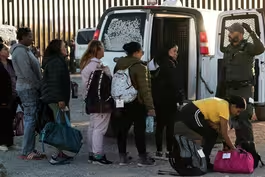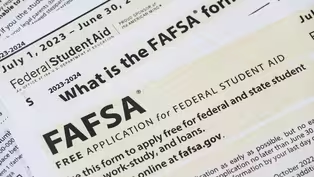
Why Sandra Day O'Connor fought to end elections of judges
Clip: 12/17/2023 | 7m 12sVideo has Closed Captions
Why Sandra Day O'Connor fought to end the practice of electing state judges
Sandra Day O'Connor, who died in December at 93, will lie in repose Monday at the Supreme Court. The retired justice of the nation’s highest court spent her last active years working to end the election of judges, which she saw as incompatible with an independent judiciary. John Yang speaks with Rebecca Love Kourlis, a former Colorado Supreme Court justice, to learn more.
Problems playing video? | Closed Captioning Feedback
Problems playing video? | Closed Captioning Feedback
Major corporate funding for the PBS News Hour is provided by BDO, BNSF, Consumer Cellular, American Cruise Lines, and Raymond James. Funding for the PBS NewsHour Weekend is provided by...

Why Sandra Day O'Connor fought to end elections of judges
Clip: 12/17/2023 | 7m 12sVideo has Closed Captions
Sandra Day O'Connor, who died in December at 93, will lie in repose Monday at the Supreme Court. The retired justice of the nation’s highest court spent her last active years working to end the election of judges, which she saw as incompatible with an independent judiciary. John Yang speaks with Rebecca Love Kourlis, a former Colorado Supreme Court justice, to learn more.
Problems playing video? | Closed Captioning Feedback
How to Watch PBS News Hour
PBS News Hour is available to stream on pbs.org and the free PBS App, available on iPhone, Apple TV, Android TV, Android smartphones, Amazon Fire TV, Amazon Fire Tablet, Roku, Samsung Smart TV, and Vizio.
Providing Support for PBS.org
Learn Moreabout PBS online sponsorshiprepose at the Supreme Court, the setting for the# accomplishments she may be best remembered for.
But her 2006 retirement for the court was# not the end of her involvement in public## affairs.
She spent her last active years# working to end the election of judges,## which is currently the practice in 39# states.
She saw it as incompatible with an## independent judiciary.
She explained it at a 2010# conversation with Judy Woodruff on the NewsHour.
SANDRA DAY O'CONNOR, Former Associate Justice of# the Supreme Court of the United States: You can## ge campaign contributions when you have# elections.
And I don't think we should## have any cash in our courtrooms.
It doesn't# belong here.
How can the judge be expected## to be absolutely fair and impartial?# If the donor is a forum and the court.
JOHN YANG: She worked on this project with# the Institute for the Advancement of the## American legal system at the University of# Denver.
Rebecca Love Kourlis i executive director of that organization.# She's also a former Supreme Court justice## in Colorado where we should add that since# 1966, all state judges have been appointed.
Rebecca, when I've heard Justice# O'Connor talk about this in the past,## she always linked it to her disappointment,# I guess you'd say or dis effects of a decision in the court in which she# was in the majority.
Can you tell us about that?
REBECCA LOVE KOURLIS, Former Exec.
Dir., Institute# for the Advancement of the American Legal System:## which there was a determination by the# United States Supreme Court that judges## could not under the for First Amendment# be constrained in their campaign speech.
The practical implication of that is that# or has been that judges are free to actually## campaign for a judicial seat too much as one# would campaign for any other elective office## without the constraints that the judicial# Code of Conduct would otherwise impose.
JOHN YANG: So much of American politics# over the last few years has played out## in the courts the fight over the# 2020 election.
Earlier this year,## there was record spending in a Supreme Court# reason Wisconsin, North Carolina redistricting## changed when the majority on the court changed.# To what extent are events making the case for you?
REBECCA LOVE KOURLIS: Yes, actually, they# absolutely are.
But the problem is that changing## judicial selection processes is constitutional# in the various states across the country.
And,## of course, just for clarification, we're# talking here now about state court judicial## selection.
Federal Judicial selection is a# whole different ball of wax or can of worms,## whichever way you want to look at it.# But that's not something with which we## worked with Justice O'Connor, and that# is a United States Constitution issue.
So these are state by state constitutions, which# are very difficult to change.
But you are so## right, the infusion of partisan politics where# they don't belong, and the increasing polarity## of partisan politics absolutely makes the argument# that judges should not be in the middle of that.
JOHN YANG: Now, your organization# and Justice O'Connor came up with## a blueprint for how to achieve this.
What# are th REBECCA LOVE KOURLIS: It's a Four Point Plan,# which is called the O'Connor Judicial Selec Plan.
In the first instance, it involves choice of# a panel of individuals by a nominating commission,## variously appointed, depending# upon the state you're looking at,## but from different appointing authorities# and with a bipartisan makeup, that commi tenders names to the governor of that state,# who then chooses one of those individuals.
The individual serves for a provisional# term is subjected to a judicial performance## evaluation process, and then stands for what# is known as retention on the ballot for a yes,## no up or down vote from the electorate# but with the benefit of having gone## through sort of the job evaluation that the# judicial performance evaluation interposes.
JOHN YANG: How much progress do you# feel you're making on this issue?
REBECCA LOVE KOURLIS: Not much, to be entirely# cand notion that they want judges to be accountable.# And to some extent, I get that you don't want## robe judges who have no connection to their# community or to the pulse of the community.
On the other hand, what that accountability# looks like is really the issue, a partisan## election where there's an R or a D or# an I or a U next to the judges name,## and where the judge has to campaign# and express opinions.
And as Justice## O'Connor said in that clip, raise# money.
That's not the answer.
There are other ways such as this judicial# performance evaluation process to achieve## accountability without it invading# impartiality.
But it's a tough sell## American electors want the capacity to yank# somebody out of office if they think they're## out of line or have some sense of control# over the process.
So it's a very tough sell.
JOHN YANG: As you worked with# Justice O'Connor on this,## did you get a sense of how# important this was to he REBECCA LOVE KOURLIS: Oh, was incredibly# important.
There w in Nevada in 2010.
And Justice O'Connor worked# the state.
I mean, she literally made herself## available for interviews and clips and almost# pounding the pavement in an effort to communicate## to Nevada voters how important this was, and it# ended up losing 58-42, I think if my memory serves But she was willing to go all out she was# so passionate about trying to ensure that## judges had the capacity to be impartial that the# noises in their head or the angels or devils on## their shoulders were not comprised of trying to# elicit public opinion in some way or raise money.
JOHN YANG: Rebecca love coreless talking## about working with Sandr REBECCA LOVE KOURLIS: You're# very welcome.
Thank you so much.
How Arizona is responding to a record surge of migrants
Video has Closed Captions
Clip: 12/17/2023 | 6m 8s | How Arizona is responding to a record surge of migrant crossings at the border (6m 8s)
What to know about upcoming changes to FAFSA
Video has Closed Captions
Clip: 12/17/2023 | 6m 42s | Why changes are coming to FAFSA and how it will affect financial aid for college (6m 42s)
Providing Support for PBS.org
Learn Moreabout PBS online sponsorship
- News and Public Affairs

FRONTLINE is investigative journalism that questions, explains and changes our world.

- News and Public Affairs

Amanpour and Company features conversations with leaders and decision makers.












Support for PBS provided by:
Major corporate funding for the PBS News Hour is provided by BDO, BNSF, Consumer Cellular, American Cruise Lines, and Raymond James. Funding for the PBS NewsHour Weekend is provided by...

